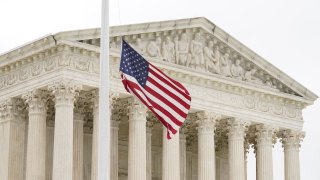
- The House Judiciary committee recently advanced a bill that would issue an ethics code for justices of the Supreme Court.
- Currently, high court justices are the only federal judges who are exempt from the Code of Conduct.
- Justices are also currently allowed to trade stocks of private companies, which could create a conflict of interest.
The U.S. Supreme Court is in the spotlight following its decision to overturn Roe v. Wade and to allow the concealed carrying of a firearm in New York. Those rulings are happening at a time when more experts are calling for reforms to the nation's highest court.
"The Supreme Court is in drastic need of reform," said Ryan D. Doerfler, professor of law at the University of Chicago. "In its current form, it is an incredibly destructive, anti-democratic institution."
The U.S. House Judiciary committee recently advanced a bill that would issue an ethics code for justices of the Supreme Court.
Get San Diego local news, weather forecasts, sports and lifestyle stories to your inbox. Sign up for NBC San Diego newsletters.
Currently, Supreme Court justices are the only federal judges who are exempt from the Code of Conduct, which is designed to maintain the integrity and independence of the judicial branch of government.
"If you're a member of Congress or a member of the executive branch, you have certain rules of the road on what it means to be a public servant," according to Gabe Roth, executive director at Fix the Court. "And the Supreme Court is exempt from almost all of them on gifts, personal hospitality, travel and disclosure."
Justices are also allowed to trade stocks of private companies which could create a conflict of interest. Justice Stephen Breyer came under fire in 2015 after failing to recuse himself in a case despite his wife's ownership of stock in the company involved.
Money Report
According to the most recent financial disclosure reports, Breyer and Justice John Roberts hold stocks in individual companies like Sysco, Raytheon and Texas Instruments.
The justices did not respond when asked for comment.
"It's a real head-scratcher as to why they would choose to participate in the market in a way that could get them in trouble and could render the court less powerful for major business decisions," said Roth.
Not all court watchers are calling for drastic reforms, however.
"We're seeing more and more attacks on the court's outright legitimacy, arguing that the justices are not legitimate because they're not reaching the outcomes that particular people would like," said Adam White, senior fellow at the American Enterprise Institute. He continued, "I think the criticism of the court right now says at least as much, maybe more about the critics than it does about the court itself."
Watch the video above to find out more about what other reforms are being considered for the Supreme Court.






